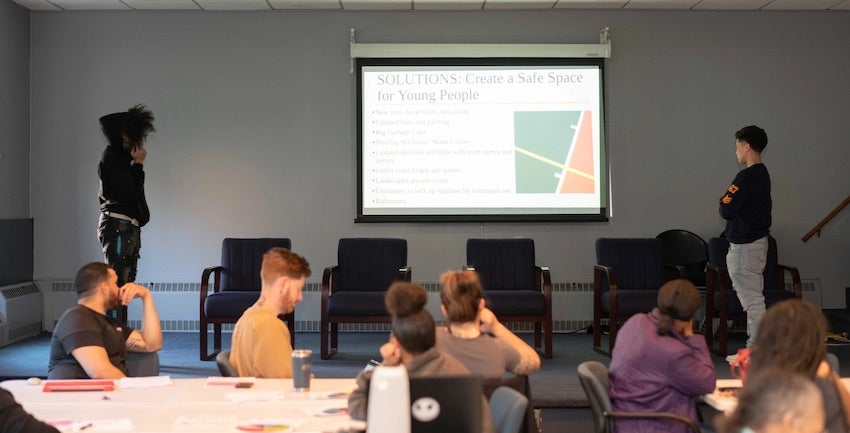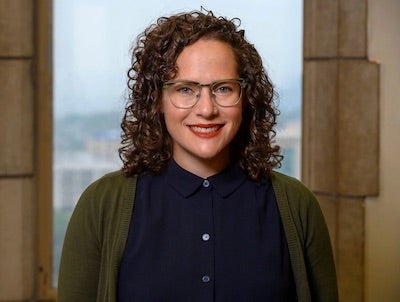
Fengyan Tang
 Title: Preventing Cognitive Decline and Dementia Among Older Chinese Immigrants: The Role of Activity, Engagement, Immigration Experience, and Neighborhood Environments
Title: Preventing Cognitive Decline and Dementia Among Older Chinese Immigrants: The Role of Activity, Engagement, Immigration Experience, and Neighborhood Environments
Funder: NIH/National Institute on Aging
About the Project: This study aims to investigate the preventive effect of activity engagement profiles (AEP) on cognitive decline and to examine whether AEP mitigate immigration-related and neighborhood-related risks for dementia among community-dwelling US Chinese aging immigrants. The rapid growth of Alzheimer and related dementias (ADRD) and of recent immigration of Chinese older adults call for population-based health interventions that are built on everyday activities. Guided by the community-based participatory research principles, the team has collaborated with over 20 community-based organizations and social services agencies in the Greater Chicago area. Learn More Here
James Huguley
 Title: Just Discipline Project
Title: Just Discipline Project
Funders: US. Department of Education, University of Chicago, The Heinz Endowments, Richard King Mellon Foundation, Staunton Farm Foundation, and Aliquippa School District.
About the Project: The Just Discipline Project: Implementation Study and Regional Impact Model (JDP) sheds much needed light on the dramatic inequalities in school discipline in the Pittsburgh region, and offers remedies aimed to serve as a national model. While local districts have begun relaxing zero-tolerance suspension policies and implementing stand-alone restorative practice programs, these shifts alone do not equip teachers and administrators with the resources and training necessary to take on the issues that tend to cause overreliance on exclusionary practices in the first place. Reforms like restorative practices have been attempted nationwide with the goal of reducing suspensions and mitigating the disparate impacts of exclusionary discipline on Black and Latinx youth, but no large-scale studies have been attempted with fully staffed programs. In response, this project evaluates the implementation and performs a cost-benefit analysis of restorative practices in urban school contexts, as well as building regional capacity and buy-in for future restorative practices work. Learn More Here
Nev Jones
 Title: Optimizing Disability benefit Decisions and Outcomes in First Episode Psychosis
Title: Optimizing Disability benefit Decisions and Outcomes in First Episode Psychosis
Funder: Research Foundation for Mental Hygiene (Prime: NIMH)
About the Project: The 5-year project will engage in extensive new data collection, involving both surveys and interviews, to better understand the factors influencing the decisions young people make, and contexts that influence these decisions, including family socioeconomics, structural racism, and the available, accessibility and quality of vocational supports. In the final phase of the grant, a participatory process will bring together key stakeholders from across the country to map out action steps at the levels of policy as well as practice with the goal of strengthening services and improving outcomes. The project will be advised by a national steering committee including impacted young people, their families and community providers. Learn More Here
Rachel Gartner
 Title: Reducing Alcohol Involved Sexual Violence in Higher Education (RAISE)
Title: Reducing Alcohol Involved Sexual Violence in Higher Education (RAISE)
Funder: National Institutes of Health
About the Project: About the Project: The study will collaborate with gender minority students and college health and counseling center providers to co-create an e-learning intervention for college health and counseling center providers focused on gender minority-competent care to enhance the universal sexual violence and hazardous drinking intervention employed in the parent study. Dr. Gartner and colleagues will pilot the feasibility of the intervention with a pilot cluster randomized trial in 15 college health and counseling centers. Learn More Here
Sara Goodkind and Jeff Shook

Title: Creating Caring Connections for Youth: Evaluation of a Countywide Pre-arrest Diversion Project
Funder: National Institute of Justice
About the Project: The team, in collaboration with Gwen’s Girls and the Black Girls Equity Alliance, will evaluate the implementation and initial impact of a community-led, countywide pre-arrest juvenile diversion initiative - called Caring Connections for Youth (CC4Y) - intended to reduce disparities in referrals the juvenal legal system. CC4Y is a 24-hour centralized call center that provides triage and de-escalation guidance and connects young people and their families with community resources and support. Learn More Here
Leah Jacobs
 Title: Can Law Enforcement Training Address Racial and Ethnic Disproportionality? An Experimental Evaluation of Effective Youth Interactions
Title: Can Law Enforcement Training Address Racial and Ethnic Disproportionality? An Experimental Evaluation of Effective Youth Interactions
Funder: National Institute of Justice
About the Project: This project will increase knowledge on policing practices and enhance efforts to promote racial equity by evaluating the impact of a unique law enforcement training program, Effective Youth Interactions, across 21 police departments in Contra Costa County, California. Effective Youth Interactions seeks to improve law enforcement officer-youth interactions, reduce youth entry into legal systems, and address racial and ethnic disproportionality in youth legal system involvement. Learn More Here
Kyaien Conner
 Title: Advancing Race-Based Research at the University of Pittsburgh
Title: Advancing Race-Based Research at the University of Pittsburgh
Funder: Pitt Momentum 2024
About the Project: This project leverages Directors/Associate Directors of the six research centers with a racial equity lens across the University of Pittsburgh to engage in strategic planning and visioning, research team development, and the development of a race-related research database with the Center on Race and Social Problems in the School of Social Work as the lead. One of the objectives of this project is to create a localized repository of race-related research and scholarship that will further amplify the work of local race-based research and create meaningful connections to community partners and external racial equity scholars. This work has the potential to empower communities to participate in the research process and have a voice in shaping the solutions to their own challenges, generate new knowledge and insights that challenge dominant narratives and assumptions and inform policy and practice that are more responsive to the needs and interests of diverse populations. Learn more here
Deborah Moon
 Title: Caregiver Relational Responsiveness (RR): An Understudied Fidelity Construct as a Mechanism to Increase Protective Factors Against Maltreatment
Title: Caregiver Relational Responsiveness (RR): An Understudied Fidelity Construct as a Mechanism to Increase Protective Factors Against Maltreatment
Funder: Centers for Disease Control and Prevention
About the Project: The study is based on the larger Randomized Controlled Trial (RCT) that Dr. Moon has been collaborating on with researchers at the Oho State University and Case Western Reserve University. In this study, Dr. Moon will examine the effects of parents’ relational engagement with family coaches on family protective outcomes for parents participating in a community-based maltreatment prevention program called the Family Success Network (FSN), which is being piloted in 3 rural counties in Ohio. Learn More Here
Shaun Eack
 Title: Cognitive Enhancement for Persistent Negative Symptoms in Schizophrenia
Title: Cognitive Enhancement for Persistent Negative Symptoms in Schizophrenia
Funder: NIMH
About the Project: Eack and his team hope to arrive at the first effective treatment for the negative symptoms of schizophrenia with their awarded R01 from the National Institute of Mental Health. This work builds on Eack’s previous research with Cognitive Enhancement Therapy, where he has shown cognitive rehabilitation approaches to be effective at improving thinking, social understanding, and key outcomes such as employment. The project will consist of an 18-month parallel arm randomized controlled trial that includes 90 outpatients with schizophrenia with persistent negative symptoms being treated with novel cognitive and psychosocial rehabilitation approaches based on Gerard E. Hogarty’s, MSW Personal Therapy and Cognitive Enhancement Therapy. Learn More Here
Mary Ohmer
 Title: Research for Power and Equity
Title: Research for Power and Equity
Funder: AmeriCorps
About the Project: This project builds Research for Power and Equity (REP) work to expand civic engagement around equitable development/equity issues by working with current REP communities to apply their Equitable Development Playbook through community projects in existing REP neighborhoods (Homewood and Hazelwood), and working with community partner UrbanKind Institute to connect residents from REP, Homewood Children's Village (HCV) Leadership Institute, and UrbanKind's Equitable and Just Greater Pittsburgh (EJGP) to participate in Advocacy and Organizing Training and identify and act on an equity issue that affects multiple communities, and forming a Regional Resident Steering to guide this project. Learn More Here
Title: A community-centered collective efficacy intervention for prevention of community violence
Funders: Centers for Disease Control and Prevention (CDC), Substance Abuse and Mental Health Services Administration (SAMSA), Allegheny County Human Services, the Pittsburgh Study, and the Department of Medicine at Pitt.
About the Project: This study will evaluate, via a cluster-randomized controlled trial, the effectiveness of an innovative community-centered intervention that promotes thriving and resiliency to reduce community violence. In collaboration with community partners, this study will implement a Community Resiliency Collective Efficacy Intervention (CRCEI) to engage community members in dialogue on neighborhood transformation, racial and gender equity, community leadership, and organizing for social change. Facilitating discussion and community organizing within neighborhoods about child and youth thriving is expected to increase individual and neighborhood levels of collective efficacy and reduce community violence. Learn More Here
Jeff Shook
 Title: Guaranteed Income Pilot Evaluation
Title: Guaranteed Income Pilot Evaluation
Funder: United Way
About the Project: Guaranteed income programs have been spreading across the country over the last several years and existing data shows that they produce a range of positive outcomes, especially for parents of color. The United Way of Southwestern Pennsylvania (UWSPA) is implementing pilot guaranteed income projects locally and is seeking to understand the effects of these programs on the well-being of single mothers. This project is a partnership between a faculty member at the University of Pittsburgh School of Social Work and the UWSPA to examine the effects of guaranteed income pilot programs that provide $500 a month to two cohorts of mothers in Western Pennsylvania. Specifically, the program seeks to understand how guaranteed income affects the financial well-being, employment, educational attainment, perceptions of interactions with children, and mental health of program participants.
To accomplish this goal a faculty member and students at the University of Pittsburgh School of Social Work will work with the UWSPA to understand the effects of the program through interviews with program participants. Interviews will include a range of closed and open-ended items that allow for the direct coding of specific measures as well as a deeper understanding of these measures and other issues relevant to the guaranteed income program. Learn More Here